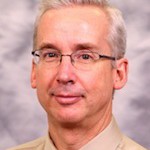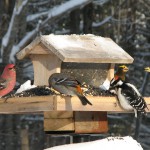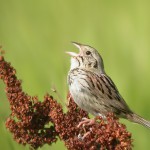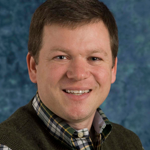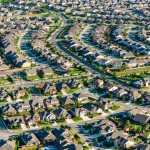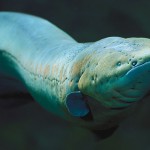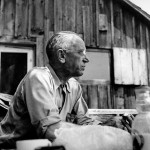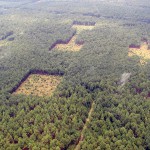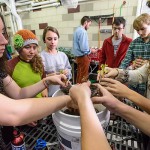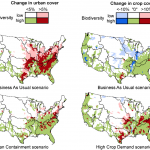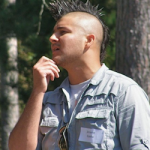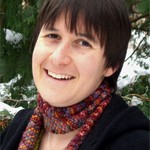Tag Conservation
New master’s program in energy conservation is first of its kind
A new professional master's program will launch at the University of Wisconsin–Madison in fall 2015 and become the first in the world specifically designed to train analytically minded students to evaluate energy efficiency and other resource-conservation initiatives.
Climate change alters cast of winter birds
Over the past two decades, the resident communities of birds that attend eastern North America’s backyard bird feeders in winter have quietly been remade, most likely as a result of a warming climate. Writing this week in the journal Global Change Biology, University of Wisconsin–Madison wildlife biologists Benjamin Zuckerberg and Karine Princé document that once rare wintering bird species are now commonplace in the American Northeast.
Balancing birds and biofuels: Grasslands support more species than cornfields
In Wisconsin, bioenergy is for the birds. Really. In a study published today in the journal PLOS ONE, University of Wisconsin–Madison and Wisconsin Department of Natural Resources (DNR) scientists examined whether corn and perennial grassland fields in southern Wisconsin could provide both biomass for bioenergy production and bountiful bird habitat. The research team found that where there are grasslands, there are birds. Grass-and-wildflower-dominated fields supported more than three times as many bird species as cornfields, including 10 imperiled species found only in the grasslands.
Environmental historian William Cronon awarded Wilderness Society’s highest honor
Environmental historian and University of Wisconsin–Madison professor William Cronon has been presented with The Wilderness Society’s Robert Marshall Award — the organization’s highest civilian honor — for his contributions to the protection of America’s wild places. The award, named for wilderness visionary Robert Marshall, is given to a private citizen who has made outstanding, long-term contributions to conservation and fostering an American land ethic.
Herbarium director receives award for telling the story of plants
Ken Cameron, director of the Wisconsin State Herbarium, received the Peter Raven Award from the American Society of Plant Taxonomists Aug. 5. Cameron, also a professor of botany at the University of Wisconsin–Madison, is a world expert on the orchid family.
No one-size-fits-all approach in a changing climate, changing land
As climate change alters habitats for birds and bees and everything in between, so too does the way humans decide to use land. Researchers at the University of Wisconsin–Madison and Aarhus University in Denmark have, for the first time, found a way to determine the potential combined impacts of both climate and land-use change on plants, animals and ecosystems across the country.
Scientists find the shocking truth about electric fish
Scientists have found how the electric fish evolved its jolt.
Sea Grant launches ‘Eat Wisconsin Fish’ campaign
Health experts agree that everyone should eat two servings of fish a week. It’s easy to make at least one of these weekly servings from a Wisconsin fish farm or the Great Lakes!
Madison Reads Leopold set for Saturday at UW Arboretum
The UW Arboretum's ninth annual Madison Reads Leopold event anchors the celebration of Aldo Leopold Weekend in the Madison area with a mix of citizen and celebrity readers giving voice to Leopold's "A Sand County Almanac."
Seed dispersal gets a test in carved-out ‘habitat corridors’
Field ecologists go to great lengths to get data: radio collars and automatic video cameras are only two of their creative techniques for documenting the natural world. So when a group of ecologists set out to see how wind moves seeds through isolated patches of habitat carved into a longleaf pine plantation in South Carolina, they twisted colored yarn to create mock seeds that would drift with the wind much like native seeds.
University Housing increasing emphasis on sustainability
A picture of Aldo Leopold graces the lobby wall in his namesake building, the newest residence hall at the University of Wisconsin–Madison.
Study puts freshwater biodiversity on the map
When it comes to economic growth and environmental impacts, it can seem like Newton's third law of motion is the rule - for every action, there is an equal and opposite reaction - and that in most cases, the economy prospers and the environment suffers.
Study suggests some fishing regs aren’t in line with fishing reality
A new study by University of Wisconsin–Madison Center for Limnology researchers says that when it comes to managing sport fisheries, regulations aren't in line with the reality of some fishing trips.
Reading the fine print: Can conservation easements allow adaptive management?
As conservation easements gain popularity for protecting privately owned land, a University of Wisconsin–Madison scientist is trying to unravel a difficult question: In the face of environmental change, how well can these easements satisfy their conservation goals?
Professional degree a new tool for conservation leaders
In the face of unprecedented environmental challenges that demand novel solutions, the University of Wisconsin–Madison will soon begin accepting applications for a model graduate degree program to train tomorrow's conservation leaders.
A virtual elephant from a marriage of biology, engineering, and art
The solid aluminum cast of an elephant on Warren Porter's desk has been waiting for 25 years.
Understanding the past and predicting the future by looking across space and time
Studying complex systems like ecosystems can get messy, especially when trying to predict how they interact with other big unknowns like climate change.
Thinking ‘big’ may not be best approach to saving large-river fish
Large-river specialist fishes - from giant species like paddlefish and blue catfish, to tiny crystal darters and silver chub - are in danger, but researchers say there is greater hope to save them if major tributaries identified in a University of Wisconsin–Madison study become a focus of conservation efforts.

